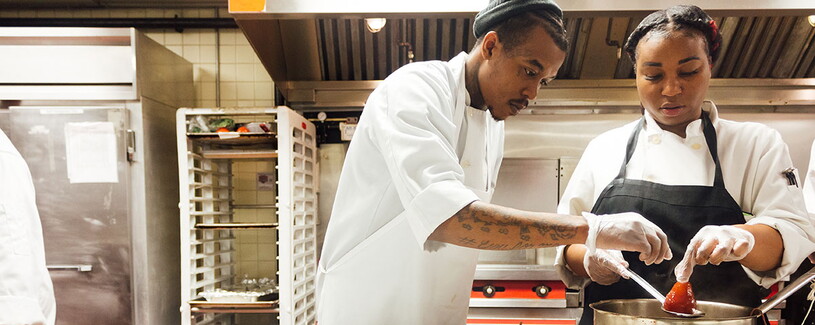Good Food, Good Jobs: Researching an Economically Equitable Restaurant Model

An ethical food system should promote public and environmental health, a thriving workforce, and nutritious products available to everyone. Put simply, it should provide food that’s fair, green, nutritious, and affordable. Food that meets these standards could be called “good” food.
There is barely an aspect of the current food system producing good food. Affordability is a challenge for at least a third of the population, making nutrition challenging. Most eaters can barely think about fairness and sustainability, let alone act upon them, and even the relatively wealthy can’t normally find food that is produced by well-compensated farmers and workers.
Yet even “bad” food is expensive to produce. Both low prices and profits result from government subsidies, tax breaks, a failed regulatory system, and ignoring external costs. But since government already supports the food system, we could reasonably ask, “Why not subsidize good food, and see providing good food to all as a function of a highly developed society?” To demonstrate the practicality of this, we must develop functioning alternatives.
Overview:
Our idea for one such alternative is to launch a nonprofit organization called Community Kitchens. Its mission is to change the model for out-of-the-home eating by offering food that is nutritious, affordable, freshly prepared by a well-paid and respected staff, and sustainably raised by fairly compensated farmers. A system providing such food might be thought of as a public utility.
Community Kitchens will offer “good” food as the public dining model for the future, a not-for-profit that will showcase the value of an eatery that ticks all the boxes for ethical food, providing everyone involved with a just and rewarding experience.
It will do that by
- Cooking from scratch, training and employing fairly paid cooks and other workers.
- Contracting with farmers to produce good food while stewarding the land.
- Providing three meals a day, each with two choices, using a four-tiered payment scale ranging from supporter to supported, with privacy assured.
Community Kitchens will be founded as a stand-alone operation (most likely in NYC), but with the intention of spreading nationwide. Its goal is not to become profitable, but to provide a model to demonstrate that the viability of offering “good” food to all is, like good health care and good education, impossible without government support.
Deliverables:
- A PDF (or other document) that catalogs the findings of your review of similar business models, and highlights key learnings that can inform Community Kitchens.
- A PDF or brief deck outlining the possible business and organizational structures for Community Kitchens, with recommendations for how to prioritize equitable leadership and opportunity.
- A living financial model for Community Kitchens. There should be a version in Excel or Google Sheets that we can continue to iterate going forward, as well as a PDF or deck summarizing the model and providing key takeaways.
Stages of Work:
- Conduct a thorough review of existing models similar to Community Kitchens
- Which social benefits are they emphasizing: Pay-what you can? Sustainable sourcing? Worker rights?
- Which have succeeded, which have failed, and why?
- How are they structured: For-profits, non-profits, social enterprises, worker-owned cooperatives?
- Start with the U.S., but note that there are also relevant international examples.
- Undoubtedly there is plenty to be learned doing secondary research, but you’ll likely want to interview business owners as well.
- Using the previous review as a knowledge base (if helpful), create an organizational model for Community Kitchens
- Is a “traditional” non-profit the optimal structure, or is there a better way?
- How should the business be structured to ensure equitable leadership?
- Create a preliminary financial model for Community Kitchens
- Start with the scaffolding: build the bones of the model (in Excel or Google Sheets) and determine what information is needed.
- Then begin to fill in as much as you can: What are the startup and ongoing operating costs? What is the expected gap between revenue and expenses (i.e. how much ongoing funding is necessary to support the operation?).
- For the sake of specificity, let’s assume that this Community Kitchen will be located in The Bronx or Washington Heights areas of New York City.
Staff and Advisors:
- Mark Bittman, Special Advisor on Food Policy at Columbia University’s Mailman School of Public Health
- Daniel Meyer, Social Entrepreneur, Food Writer
- Tagan Engel, Resident Fellow at the Yale Center for Business and the Environment
- Stuart DeCew, Executive Director at the Yale Center for Business and the Environment
- Todd Cort, Lecturer at Yale and Faculty Co-director at the Yale Center for Business and the Environment
How to Apply
We are looking to build a team of 2-3 students. To apply for this independent study, please send your resume and a statement of interest no longer than half a page to Heather Fitzgerald (heather.fitzgerald@yale.edu).
This is a full-semester independent study and is equivalent to a full-credit course.